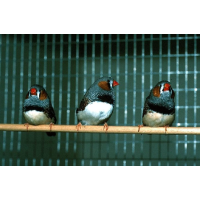Single parent zebra finches do best

Bickering birds spend less time looking after their offspring
Single mums are better at raising their kids than two parents - at least in the bird world, say biologists from the University.
Mother zebra finches have to work harder and raise fewer chicks on their own, but the also produce sexier sons who are more likely to get a mate.
The findings show that family conflict is as important an evolutionary driving force as ecological factors such as predation and food supply. With two parents around there is always conflict of interests, which can have a detrimental effect on the quality of offspring.
Ian Hartley from Biological Sciences and his team wondered how families resolve this conflict, and how the conflict itself affects the offspring.
To find out they measured how much effort zebra finch parents put into raising their broods. They compared single females with pairs, by monitoring the amount of food each parent collected and removing or adding chicks so that each pair of birds was raising four chicks and each single mum had two - supposedly the same workload.
They found that single mums put in about 25 per cent more effort than females rearing with their mate. To avoid being exploited mothers with a partner hold back from working too hard if the father is being lazy and it's the chicks that pay the price.
"The offspring suffer some of the cost of this conflict," says Ian.
The cost does not show in any obvious decrease in weight or size, but in how attractive they are to the opposite sex. When the chicks were mature, the researchers tested the fitness of the male offspring by offering females their choice of partner. Those males reared by single mums were chosen more often than those from two parent families.
Sexual conflict has long been thought to affect the quality of care given to offspring and the breakthrough here is showing it empirically.